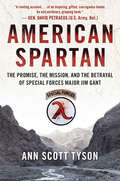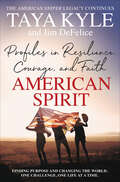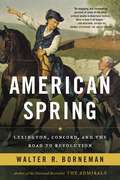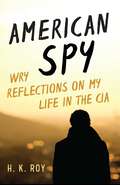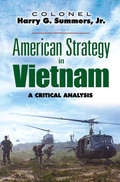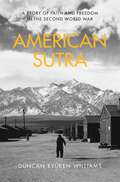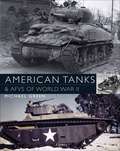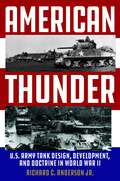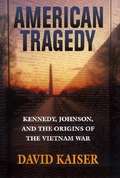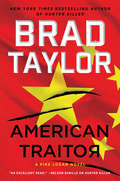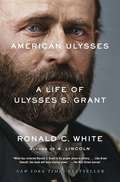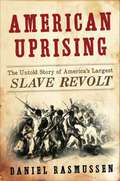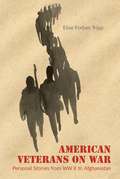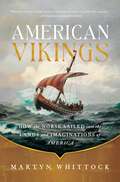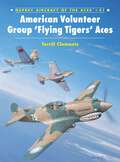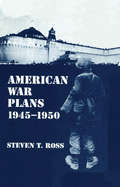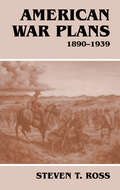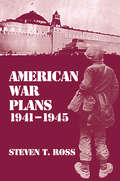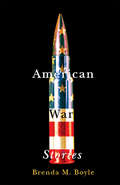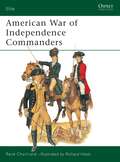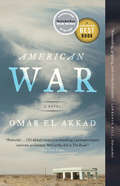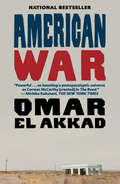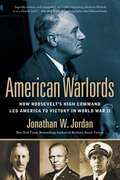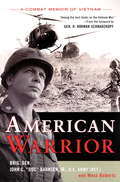- Table View
- List View
American Spartan: The Promise, the Mission, and the Betrayal of Special Forces Major Jim Gant
by Ann Scott TysonA gripping account of a U.S. Army Special Forces major’s journey into the tribal Pashtuns of Afghanistan by a Pulitzer Prize–nominated author.One of the most charismatic, controversial U.S. commanders of modern memory, Army Special Forces Major Jim Gant changed the face of America’s war in Afghanistan when his critical white paper, “One Tribe at a Time,” went viral at the Pentagon, the White House, and on Capitol Hill in 2009.A decorated Green Beret who had spent years training indigenous fighters, Jim argued for embedding autonomous units with tribes across Afghanistan: these American soldiers would live among Afghans for extended periods, not only to train tribal militias but also to fight with them in battle. He argued that these small U.S. teams could earn the trust of the Afghans and transform them into reliable allies with whom we could defeat the Taliban and Al Qaeda networks.Correspondent Ann Scott Tyson came to share Jim’s vision that Americans and Pashtuns could fight side-by-side and create real change across the region, so she accompanied him to Afghanistan. This remarkable story—of Jim’s close relationships with village elder Noor Afzhal, the fierce fighting they took straight to the enemy in the mountains of Konar Province, and Ann and Jim’s deepening love for each other—is told with a keen sense of drama and immediacy.A story like no other, American Spartan is one of the most remarkable and emotionally resonant narratives of war ever published.
American Speeches: Political Oratory from Abraham Lincoln to Bill Clinton
by Ted WidmerFrom the book: Public speeches have profoundly shaped American history and culture, transforming not only our politics but also our language and our sense of national identity. This volume collects the unabridged texts of 83 eloquent and dramatic speeches delivered by 45 American public figures between 1865 and 1997, beginning with Abraham Lincoln's last speech on Reconstruction and ending with Bill Clinton's heartfelt tribute to the Little Rock Nine. During this period American political oratory continued to evolve, as a more conversational style, influenced by the intimacy of radio and television, emerged alongside traditional forms of rhetoric. Included are speeches on Reconstruction by Thaddeus Stevens and African-American congressman Robert Brown Elliott, Frederick Douglass's brilliant oration on Abraham Lincoln, and Oliver Wendell Holmes's "touched with fire" Memorial Day Address. Speeches by Robert Ingersoll and William Jennings Bryan capture the fervor of 19th-century political conventions, while Theodore Roosevelt and Carl Schurz offer opposing views on imperialism. Ida B. Wells and Mary Church Terrell denounce the cruelty of lynching and the injustice of Jim Crow; Susan B. Anthony, Elizabeth Cady Stanton, and Carrie Chapman Catt advocate the enfranchisement of women; and Woodrow Wilson and Henry Cabot Lodge present conflicting visions of the League of Nations. Also included are wartime speeches by George Patton and Dwight Eisenhower; an address on the atomic bomb by J. Robert Oppenheimer; Richard Nixon's "Checkers Speech"; Malcolm X's "The Ballot or the Bullet"; Barry Goldwater's speech to the 1964 Republican convention; Mario Savio urging Berkeley students to stop "the machine"; Barbara Jordan defending the Constitution during Watergate; and an extensive selection of speeches by Franklin Roosevelt, Martin Luther King, John F. Kennedy, and Ronald Reagan. Ted Widmer, editor, is t
American Spirit: Profiles in Resilience, Courage, and Faith
by Taya Kyle Jim DeFeliceThe "American Sniper" legacy continues: Taya Kyle celebrates the American Spirit in her inspiring new bookLife leads us through difficult terrain. But what happens if you use challenge as an opportunity to discover your PURPOSE? These Americans did and are changing the world. After losing her husband, "American Sniper" Chris Kyle, bestselling author Taya Kyle entered a period of deep grief. And yet the experience served as a catalyst for profound growth. Taya found her own reserve of strength with the help of the generous love and support of family and friends—and also many strangers across America, who selflessly shared their own stories of suffering, survival, and triumph. Inspired by her experience, Taya discovered her calling: spreading a message of how love, passion, and service can combine to help us persevere over personal pain and heal our communities. Working with trusted collaborator Jim DeFelice (coauthor of American Sniper and American Wife), Taya tells her own story, as well as those of other Americans who have built extraordinary lives after traveling down life’s most difficult roads—through loss, illness, all manner of setback. They embody the “American spirit” of resilience, faith, togetherness that has built the nation. American Spirit profiles more than 30 individuals, young and old, rich and not-so-rich, famous and unknown, who have overcome hardship and done extraordinary things for their communities and for the nation at large. The 9/11 survivor, badly burned over 60% of his body, who asked himself What debt do I owe to God? And to my fellow human beings? What am I supposed to do with this miracle of survival? The man with the hole in his heart who runs ultramarathons. The young cancer victim whose lemonade stand inspired a revolutionary new model for fighting cancer. The blind cyclist; the pastor who became an undercover investigator, and more. In the end, these stories teach us how to find purpose and heal the world, no matter the difficulty. “Every action, big or small,” Taya writes, “has the potential to spark someone else’s movement.”
American Spring: Lexington, Concord, and the Road to Revolution
by Walter R. BornemanA vibrant new look at the American Revolution's first months, from the author of the bestseller The Admirals When we reflect on our nation's history, the American Revolution can feel almost like a foregone conclusion. In reality, the first weeks and months of 1775 were very tenuous, and a fractured and ragtag group of colonial militias had to coalesce rapidly to have even the slimmest chance of toppling the mighty British Army.AMERICAN SPRING follows a fledgling nation from Paul Revere's little-known ride of December 1774 and the first shots fired on Lexington Green through the catastrophic Battle of Bunker Hill, culminating with a Virginian named George Washington taking command of colonial forces on July 3, 1775.Focusing on the colorful heroes John Hancock, Samuel Adams, Mercy Otis Warren, Benjamin Franklin, and Patrick Henry, and the ordinary Americans caught up in the revolution, Walter R. Borneman uses newly available sources and research to tell the story of how a decade of discontent erupted into an armed rebellion that forged our nation.
American Spy: Wry Reflections on My Life in the CIA
by H. K. RoyThis ain't your daddy's spy story. In a memoir written as a series of narrative vignettes, a former CIA operations officer recounts his years of danger, intrigue, and adventure. This candid and darkly witty memoir recounts an exhilarating life --and a few close brushes with death. With remarkable sangfroid and a humorist's eye for absurdity, H. K. Roy describes his many strange and risky exploits in his long career with the CIA. Whether he was pursuing Soviet and Cuban spies, running "denied area" operations in Eastern Europe, hunting Bosnian War criminals, or providing actionable intelligence to US government and coalition forces in Iraq, Roy usually found himself at the right place at the right time. Except when he didn't--like the time he stumbled into a life-threatening ambush by Iranian terrorists while dodging Serb snipers and shelling in Sarajevo. Eight summers later, caught in a blinding sandstorm between Amman and Baghdad, he learned his fate was in the hands of an Iraqi tribal chief who had just lost his entire family to a US airstrike in Ramadi, in a failed attempt to kill Saddam Hussein that had tragic consequences. Combining dedication to duty with a maverick's disdain for bureaucracy, Roy makes it clear that he prefers foreign locales to Washington and thrives on the adrenaline rush that comes with danger. He also sheds much light on why intelligence is an essential component of national defense, even our very survival as a nation.
American Strategy in Vietnam: A Critical Analysis
by Col. Harry G Summers Jr.Required reading at The National, Naval, and Air War Colleges, as well as other high level military institutions throughout the United States, American Strategy in Vietnam has become one of the most-well-respected investigations of the strategic and tactical policies of the U.S. Army during the twentieth century. Crackling with keen insight and clarity, this invaluable resource has renewed the study of strategy and its vital relationship to the art of war.Drawing heavily on the brilliant theories of the great Prussian general Carl von Clausewitz, this is the definitive politico-military assessment of the Vietnam War. Instead of merely examining the individual strategic flaws of the conflict, the book embraces a larger scope: how the weak relationship between military strategy and national policy led to the Vietnam War's unpopular and faulty definition--and eventual failure. Particularly relevant today, this important exposé stresses the futility of any military action without the full support and involvement of the country's people.
American Sutra: A Story of Faith and Freedom in the Second World War
by Duncan Ryūken WilliamsDuncan Ryūken Williams reveals the little-known story of how, in the darkest hours of World War II when Japanese Americans were stripped of their homes and imprisoned in camps, a community of Buddhists launched one of the most inspiring defenses of religious freedom in our nation’s history, insisting that they could be both Buddhist and American.
American Tanks and AFVs of World War II
by Mike GreenStuart, Sherman, Lee, and Grant tanks dominated the US Army and Marine Corps armored warfare effort versus Nazi Germany and Tojo's Japan. This book details the full range of these vehicles, giving technical specifications and development features as well as describing how they were manned and fought in battle.The equipping of the United States military with the weapons it needed to prevail during World War II was an unparalleled example of America's industrial might at the time. Among the many weapons produced by America's workers, tanks rate as an important example with 88,140 built between 1939 and 1945. This was almost twice what Germany and Great Britain built combined during the same period. These tanks not only equipped America's ground forces but saw service with many allied armies. In addition to the 18,620 tank-based variants, such as armored engineering vehicles, self-propelled artillery, armored recovery vehicles, and tank destroyers, American factories went on to design and build thousands of wheeled armored cars for reconnaissance purposes and armored half-tracks to transport the infantry into battle behind the tanks. Like the tanks, American armored half-tracks were modified to serve a wide variety of jobs including self-propelled artillery, tank destroyers and antiaircraft vehicles. So useful were these vehicles that they would remain in service with foreign armies for decades after World War II. To complement its inventory of tanks and armored fighting vehicles the American military industrial complex also designed and built over 18,000 amphibian tractors. Appearing in both unarmored and armored variants they went into combat with a wide variety of armaments. Referred to as the Landing Vehicle Tracked (LVT) they would serve not only with the U.S. Marine Corps who often called them "Amtracs" but the US Army who referred to them as the "Water Buffalo." They would allow the American military to take the fight to the far flung Japanese Empire wherever it had established itself in the vast reaches of the Pacific Area of Operations. These same vehicles would also see service in the ETO with the US Army and allied forces when it came time to cross various water obstacles used by the German military as defensive barriers.
American Thunder: U.S. Army Tank Design, Development, and Doctrine in World War II
by Richard C. Anderson Jr.If the machine gun changed the course of ground combat in the First World War, it was the tank that shaped ground combat in World War II. The tank was introduced in World War I in an effort to end the stalemate of the machine gun versus barbed-wire trenches, and by World War II, the tank&’s mobility and firepower became a rolling, thundering difference-maker on the battlefield. In this detailed, deeply researched, and heavily illustrated book, tank expert Richard Anderson tells the story of how the United States developed its armored force, turning it into a war-winning weapon in World War II that powered American ground forces and supplied armies around the world, including the British and Soviets.For decades, American tanks of World War II have been undervalued in comparisons with German and Soviet tanks—and it&’s true that the best of American armor tended to underperform the best of German and Soviet armor during the war. That&’s because the U.S. had a different goal: not only to create battleworthy tanks like the Sherman, and to develop other tanks, but also to supply American allies with serviceable, combat-ready tanks. The United States did all this, but until now the complete story of American tanks in World War II has yet to be told.Anderson&’s book is deeper and more thorough a chronicle of American tanks in World War II than has ever been done. This book is colorful, vivid, and thought-provokingly insightful on how the U.S. produced a tank force capable of conducting its own battlefield efforts and sustaining key allies around the world. This will be the go-to volume on American tanks for years to come.
American Tragedy: Kennedy, Johnson, and the Origins of the Vietnam War
by David E. KaiserFought as fiercely by politicians and the public as by troops in Southeast Asia, the Vietnam War--its origins, its conduct, its consequences--is still being contested. In what will become the classic account, based on newly opened archival sources, David Kaiser rewrites what we know about this conflict. Reviving and expanding a venerable tradition of political, diplomatic, and military history, he shows not only why we entered the war, but also why our efforts were doomed to fail. American Tragedy is the first book to draw on complete official documentation to tell the full story of how we became involved in Vietnam--and the story it tells decisively challenges widely held assumptions about the roles of Eisenhower, Kennedy, and Johnson. Using an enormous range of source materials from these administrations, Kaiser shows how the policies that led to the war were developed during Eisenhower's tenure and nearly implemented in the closing days of his administration in response to a crisis in Laos; how Kennedy immediately reversed course on Laos and refused for three years to follow recommendations for military action in Southeast Asia; and how Eisenhower's policies reemerged in the military intervention mounted by the Johnson administration. As he places these findings in the context of the Cold War and broader American objectives, Kaiser offers the best analysis to date of the actual beginnings of the war in Vietnam, the impact of the American advisory mission from 1962 through 1965, and the initial strategy of General Westmoreland. A deft re-creation of the deliberations, actions, and deceptions that brought two decades of post-World War II confidence to an ignominious end, American Tragedy offers unparalleled insight into the Vietnam War at home and abroad--and into American foreign policy in the 1960s.
American Traitor: A Pike Logan Novel (Pike Logan #15)
by Brad Taylor“Few authors write about espionage, terrorism, and clandestine hit squads as well as Taylor does.”—Houston Press Pike Logan is on the desperate hunt for a man who is about to betray his country—and ignite a horrific new world war—in this pulse-pounding thriller from New York Times bestselling author and former special forces officer Brad Taylor Pike Logan and Jennifer Cahill are enjoying a sunny vacation down under when they get disturbing news: their friend and colleague Clifford Delmonty is in serious trouble. While working as a contractor at an Australian F-35 facility, the former Taskforce member—callsign Dunkin—saw something he shouldn’t have, and now he’s on the run from Chinese agents. Pike and Jennifer soon discover that Dunkin’s attackers are a dangerous link to a much larger scheme that could launch a full-on conflict between China and Taiwan. In its quest for dominance, China is determined to reclaim Taiwan—a pivotal ally the United States has sworn to protect. Pike learns that the Chinese have a devious plan to bait the island nation into all-out war by destabilizing the government and manipulating an artificial intelligence defense system. As the threat reaches a boiling point, Pike alone realizes that what they’re seeing isn’t actually real. A soldier who has always been trained to fight and win, Pike must now track down and neutralize the missing man who holds the key. With the help of Jennifer, the Taskforce team, and a brave Taiwanese intelligence agent, he races to prevent a catastrophic conflict from consuming a whole region of the world. <P><P><b>A New York Times Bestseller</b>
American Ulysses: A Life of Ulysses S. Grant
by Ronald C. WhiteNEW YORK TIMES BESTSELLER • From the author of A. Lincoln, a major new biography of one of America’s greatest generals—and most misunderstood presidentsFinalist for the Gilder-Lehrman Military History Book Prize In his time, Ulysses S. Grant was routinely grouped with George Washington and Abraham Lincoln in the “Trinity of Great American Leaders.” But the battlefield commander–turned–commander-in-chief fell out of favor in the twentieth century. In American Ulysses, Ronald C. White argues that we need to once more revise our estimates of him in the twenty-first. Based on seven years of research with primary documents—some of them never examined by previous Grant scholars—this is destined to become the Grant biography of our time. White, a biographer exceptionally skilled at writing momentous history from the inside out, shows Grant to be a generous, curious, introspective man and leader—a willing delegator with a natural gift for managing the rampaging egos of his fellow officers. His wife, Julia Dent Grant, long marginalized in the historic record, emerges in her own right as a spirited and influential partner. Grant was not only a brilliant general but also a passionate defender of equal rights in post-Civil War America. After winning election to the White House in 1868, he used the power of the federal government to battle the Ku Klux Klan. He was the first president to state that the government’s policy toward American Indians was immoral, and the first ex-president to embark on a world tour, and he cemented his reputation for courage by racing against death to complete his Personal Memoirs. Published by Mark Twain, it is widely considered to be the greatest autobiography by an American leader, but its place in Grant’s life story has never been fully explored—until now. One of those rare books that successfully recast our impression of an iconic historical figure, American Ulysses gives us a finely honed, three-dimensional portrait of Grant the man—husband, father, leader, writer—that should set the standard by which all future biographies of him will be measured.
American Uprising: The Untold Story of America's Largest Slave Revolt
by Daniel Rasmussen&“A chilling and suspenseful account [of] the culmination of a signal episode in the history of American race relations.&” —Adam Goodheart, The New York Times Book Review In January 1811, five hundred slaves, dressed in military uniforms and armed with guns, cane knives, and axes, rose up from the plantations around New Orleans and set out to conquer the city. Ethnically diverse, politically astute, and highly organized, this self-made army challenged not only the economic system of plantation agriculture but also American expansion. Their march represented the largest act of armed resistance against slavery in the history of the United States. American Uprising is the riveting, long-neglected story of the rebel army's dramatic march on the city, and its shocking conclusion. No North American slave uprising—not Gabriel Prosser's, not Denmark Vesey's, not Nat Turner's—has rivaled the scale of this rebellion either in terms of the number of the slaves involved or the number who were killed. More than one hundred slaves were slaughtered by federal troops and French planters, who then sought to write the event out of history and prevent the spread of the slaves' revolutionary philosophy. Through groundbreaking research, Daniel Rasmussen offers a window into expansionist America, illuminating the early history of New Orleans and providing new insight into the path to the Civil War and the slave revolutionaries who fought and died for the hope of freedom. &“Crisp, confident . . . Rasmussen tells this story with verve.&” —John Stauffer, The Wall Street Journal &“Breathtaking. . . . [A] fascinating narrative of slavery and resistance [that] tells us something about history itself—about how fiction can become fact, and how &‘history&’ is sometimes nothing more than erasure.&” —Henry Louis Gates, Jr.
American Veterans on War: Personal Stories from WW II to Afghanistan
by Elise Forbes TrippThe United States is embroiled in conflicts in Iraq and Afghanistan-wars that seem as far from Americans' understanding as they are distant from our shores.With American Veterans on War, Elise Forbes Tripp brings our current wars and their predecessors home in the words of 55 veterans aged 20 to 90. The veterans raise questions about when wars are worth fighting, what missions can and can't be won, and the costs and benefits of US intervention, both around the world and domestically. Recent veterans tell wrenching stories of coping with hostile forces without uniforms, of not knowing who is friend or foe, and of the lasting traces of combat once they've returned home.American Veterans on War provides a sweeping overview of three-quarters of a century of American wars, properly grounding that history in the words of the men and women whose bodies were on the line.
American Vikings: How the Norse Sailed into the Lands and Imaginations of America
by Martyn WhittockA vivid and illuminating new history—separate fact from fiction, myth from legend—exploring the early Vikings settlements in North America.Vikings are an enduring subject of fascination. The combination of adventure, mythology, violence, and exploration continues to grip our attention. As a result, for more than a millennium the Vikings have traveled far and wide, not least across the turbulent seas of our minds and imaginations. The geographical reach of the Norse was extraordinary. For centuries medieval sagas, first recorded in Iceland, claimed that Vikings reached North America around the year 1000. This book explores that claim, separating fact from fiction and myth from mischief, to assess the enduring legacy of this claim in America. The search for &“American Vikings&” connects a vast range of different areas; from the latest archaeological evidence for their actual settlement in North America to the myth-making of nineteenth-century Scandinavian pioneers in the Midwest; and from ancient adventurers to the political ideologies in the twenty-first century. It is a journey from the high seas of a millennium ago to the swirling waters and dark undercurrents of the online world of today. No doubt, the warlike Vikings would have understood how their image could be &“weaponized.&” In the same way, they would probably have grasped how their dramatic, violent, passionate, and discordant mythologies could appeal to our era and cultural setting. They might, though, have been more surprised at how their image has been commercialized and commodified. A vivid new history by a master of the form, American Vikings explores how the Norse first sailed into the lands, and then into the imaginations, of America.
American Volunteer Group 'Flying Tigers' Aces
by Jim Laurier Terrill ClementsThe American Volunteer Group, or 'Flying Tigers', have remained the most famous outfit to see action in World War II. Manned by volunteers flying American aircraft acquired from the British, the AVG fought bravely in the face of overwhelming odds in China and Burma prior to the US entry into World War II. Pilots such as 'Pappy' Boyington, R T Smith and John Petach became household names due to their exploits against the Japanese Army Air Force. The AVG legend was created flying the Curtis P-40 Tomahawk and Kittyhawk. This volume dispels the myths surrounding the colours and markings worn by these famous fighters.
American War Plans 1945-1950
by Steven T. RossIn late 1945, it became clear that the Soviet Union was an aggressive power. American military planners began to develop strategies to deal with the frightening possibility of a war with the Soviet Union. This work examines those plans.
American War Plans, 1890-1939
by Steven T. RossBy the close of the 19th century, the United States was no longer a continental power, but had become a nation with interests that spanned the globe from the Caribbean to China. Consequently, the country faced a new set of strategic concerns, ranging from enforcing the Monroe Doctrine to defending the Philippines.As a result of the United States' new geostrategic environment, the armed services had to establish a system for the creation of war plans to defend the country's interests against possible foreign aggression. A Joint Army and Navy Board, established in 1903, ordered the creation of war plans to deal with real and potential threats to American security. Each major country was assigned a colour: Germany was Black, Great Britain Red, Japan Orange, Mexico Green and China Yellow. War plans were then devised in case Washington decided to use force against these or other powers.
American War Plans, 1941-1945: The Test of Battle
by Steven RossThis is an examination of major American and Anglo-American war plans. Rather than discuss the history of planning, Ross considers the execution of the plans, compares the execution with the expectations of the planners and attempts to explain the differences.
American War Stories (War Culture)
by Brenda M. BoyleAmerican War Stories asks readers to contemplate what traditionally constitutes a “war story” and how that constitution obscures the normalization of militarism in American culture. The book claims the traditionally narrow scope of “war story,” as by a combatant about his wartime experience, compartmentalizes war, casting armed violence as distinct from everyday American life. Broadening “war story” beyond the specific genres of war narratives such as “war films,” “war fiction,” or “war memoirs,” American War Stories exposes how ingrained militarism is in everyday American life, a condition that challenges the very democratic principles the United States is touted as exemplifying.
American War of Independence Commanders
by Richard Hook Rene ChartrandThe commanders who led the opposing armies of the American War of Independence (1775-1783) came from remarkably different backgrounds. They included not only men from Britain and America, but from Germany, France and Spain as well. Some were from the great families of the "Old World," while others were frontiersmen or farmers in the "New World." Despite their differing origins, all were leaders in the events that led to the establishment of the United States of America. This book details the appearance, careers and personalities of the commanders on both sides. It covers such famous figures as George Washington and Lord Cornwallis along with less well-known men such as Admiral Suffren and Bernando de Galvez.
American War: A Novel
by Omar El AkkadAn audacious and powerful debut novel: a second American Civil War, a devastating plague, and one family caught deep in the middle -- a story that asks what might happen if America were to turn its most devastating policies and deadly weapons upon itself.Sarat Chestnut, born in Louisiana, is only six when the Second American Civil War breaks out in 2074. But even she knows that oil is outlawed, that Louisiana is half underwater, that unmanned drones fill the sky. And when her father is killed and her family is forced into Camp Patience for displaced persons, she quickly begins to be shaped by her particular time and place until, finally, through the influence of a mysterious functionary, she is turned into a deadly instrument of war. Telling her story is her nephew, Benjamin Chestnut, born during war as one of the Miraculous Generation and now an old man confronting the dark secret of his past -- his family's role in the conflict and, in particular, that of his aunt, a woman who saved his life while destroying untold others.
American War: A Novel
by Omar El AkkadNATIONAL BESTSELLER • A second American Civil War, a devastating plague, and one family caught deep in the middle—this gripping debut novel asks what might happen if America were to turn its most devastating policies and deadly weapons upon itself. From the author of What Strange Paradise"Powerful ... as haunting a postapocalyptic universe as Cormac McCarthy [created] in The Road." —The New York TimesSarat Chestnut, born in Louisiana, is only six when the Second American Civil War breaks out in 2074. But even she knows that oil is outlawed, that Louisiana is half underwater, and that unmanned drones fill the sky. When her father is killed and her family is forced into Camp Patience for displaced persons, she begins to grow up shaped by her particular time and place. But not everyone at Camp Patience is who they claim to be. Eventually Sarat is befriended by a mysterious functionary, under whose influence she is turned into a deadly instrument of war. The decisions that she makes will have tremendous consequences not just for Sarat but for her family and her country, rippling through generations of strangers and kin alike.
American Warlords: How Roosevelt's High Command Led America to Victory in World War II
by Jonathan W. JordanFrom New York Times bestselling author Jonathan W. Jordan--author of Brothers, Rivals, Victors--comes the intimate true story of President Franklin Roosevelt's inner circle of military leadership, the team of rivals who shaped World War II and America. After the attack on Pearl Harbor, the United States was wakened from its slumber of isolationism. To help him steer the nation through the coming war, President Franklin Roosevelt turned to the greatest "team of rivals" since the days of Lincoln: Secretary of War Henry Stimson, Admiral Ernest J. King, and General George C. Marshall. Together, these four men led the nation through history's most devastating conflict and ushered in a new era of unprecedented American influence, all while forced to overcome the profound personal and political differences which divided them. A startling and intimate reassessment of U.S. leadership during World War II, American Warlords is a remarkable glimpse behind the curtain of presidential power.From the Trade Paperback edition.ed America from isolation to the summit of global power. Written in a robust, engaging style, author Jonathan W. Jordan offers a vivid portrait of four extraordinary Americans in the eye of war's hurricane.
American Warrior
by Wess Roberts Brig. Gen. John C. Bahnsen Jr.Brigadier General John C. "Doc" Bahnsen, Jr. One of America's most decorated soldiers in the Vietnam War. The ultimate warrior who engaged the enemy from nearly every type of aircraft and armored vehicle in the Army's inventory. An expert strategist who developed military tactics later adopted as doctrine. A revered leader ready to plunge into the thick of battle with his bare hands...From Fort Knox to the front lines, accounts of Doc's brilliance in time of war became the stuff of legend--stories that are told with reverence to this day, inspiring raw recruits as well as America's future leaders. Now, drawing on his own recollections, as well as those of the men who fought beside him, Doc Bahnsen gives a full, uncensored account of his astonishing war record--and an unforgettable ground-level view of the day-to-day realities of serving one's country."Spellbinding. . .a must-read."--Thomas E. White, Jr.,18th Secretary of the Army"Uncensored, raw, and striking. . .I recommend it highly."--General Barry R. McCaffrey"Packed with heaps of heroism, courage, sacrifice, controvery--and a dash of humor."--Major General James L. Dozier"This book explodes like a hand grenade. Be ready for a hell of a read!"--Lieutenant General Hank Emerson**Main Selection of the Military Book Club**
